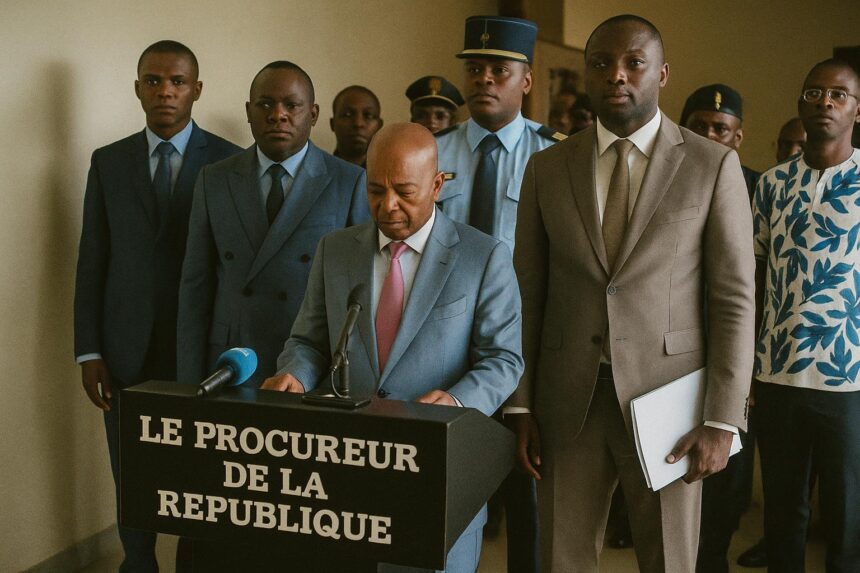Arrests Spark Measured Judicial Response
The early-morning transfer of lawyer Bob Kaben Massouka and six co-suspects to Brazzaville’s central prison on 22 July has reverberated through the Congolese capital. Following nearly a fortnight of questioning at the Centrale d’Intelligence et de Documentation, the group now stands formally indicted for association of malefactors and attempted breach of internal security. Public prosecutor André Gakala-Oko framed the decision as a textbook exercise in flagrant-crime procedure, underscoring that “the gravity of the facts required immediate judicial containment” (Les Dépêches de Brazzaville, 23 July 2025). The measured yet firm tone sought to reassure both domestic and foreign observers that the rule of law, rather than political expediency, guides the unfolding process.
Legal Framework Underpinning the Charges
Articles 265 to 267 of the Congolese Penal Code, bolstered by Article 55 of the Code of Criminal Procedure, constitute the backbone of the indictment. Prosecutors allege that the defendants conspired around a social-media call titled “Mobilisation for the Liberation of Congo, 10 July 2025,” disseminated from abroad by a certain Balou Castellin Cédric. The prosecution claims that encrypted Thuraya phones, foreign Airtel SIM cards and imminent deliveries of PMK-type rifles underscore the operational aspect of the enterprise. By invoking the notion of crime flagrant, authorities bypassed the ordinarily stringent safeguards tied to the arrest of legal professionals, a step rendered permissible under Congolese jurisprudence whenever imminent danger to state security is demonstrated. Legal analysts interviewed by Télé Congo note that the government’s reliance on explicit statutory language aims to minimise perceptions of arbitrariness and to confine the debate to the courtroom.
Regional Security Dimension and Seleka Legacy
Beyond domestic legalities, the affair touches on fragile regional equilibriums. Two of the detainees are identified as former Seleka combatants from the neighbouring Central African Republic, a reminder that porous borders often translate into transnational security challenges. United Nations reports have repeatedly warned of ex-combatant itinerancy in the Sangha-Mbaéré corridor, where small arms circulate with relative ease (UN Panel of Experts, 2024). Brazzaville’s decision to prosecute the matter internally rather than seek foreign extradition signals confidence in national institutions while sending a calibrated deterrent message to would-be subcontractors of instability.
Balancing Civil Liberties and State Stability
Civil-society voices, including the Congolese Bar Association, acknowledge the state’s duty to safeguard constitutional order but emphasise that due-process guarantees must remain intact. “We expect transparency at every procedural milestone,” argued a senior member of the Bar on Radio Maya. Government spokesperson Thierry Moungalla, for his part, stressed that “security imperatives do not eclipse judicial oversight; they operate in tandem.” The measured exchange illustrates the broader quest for equilibrium between collective security and individual rights—an equilibrium closely monitored by diplomatic missions in Brazzaville as an indicator of the country’s institutional maturity.
International Observations and Diplomatic Stakes
European Union and African Union envoys, while refraining from public commentary, privately signal interest in the evidentiary threshold required for convictions and the potential precedent for handling cross-border insurgency networks. Congo-Brazzaville’s recent accession to the African Continental Free Trade Area accentuates the premium placed on predictable legal environments. A Western diplomat summarised the mood succinctly: “Investors and partners judge stability not only by the absence of conflict but by the presence of credible legal recourse.” Should the proceedings validate both the seriousness of the threat and the integrity of the judicial process, Brazzaville could strengthen its case for greater regional leadership on counter-terrorism.
Outlook for the Trials Ahead
Pre-trial hearings are expected to commence in early September, giving defence teams time to scrutinise the prosecution’s digital forensics and intelligence dossiers. Observers anticipate a methodical pace, consistent with Congo-Brazzaville’s civil-law tradition, where the investigative phase often eclipses the courtroom in determining outcomes. The calibrated handling of this high-profile file offers the government an opportunity to showcase institutional resilience, affirm civil-military cohesion and project a narrative of lawful vigilance. For the diplomatic community, the case will serve as a barometer of how Brazzaville navigates the fine line between safeguarding the state and nurturing the democratic credentials essential to its international partnerships.




















